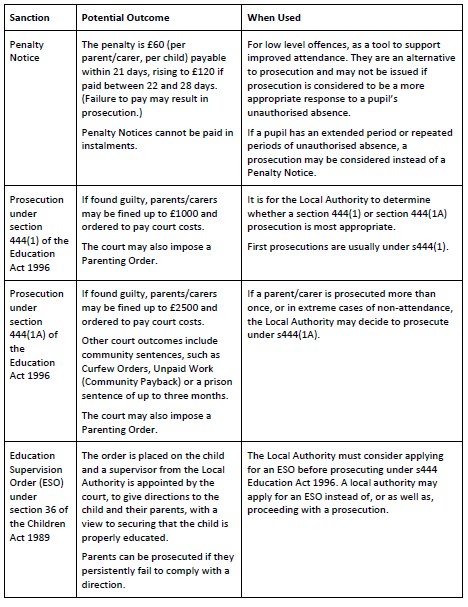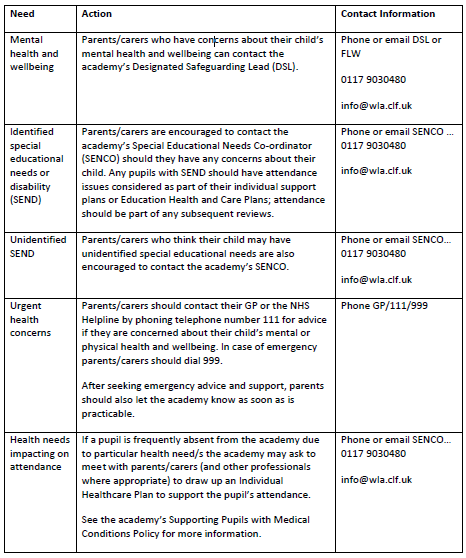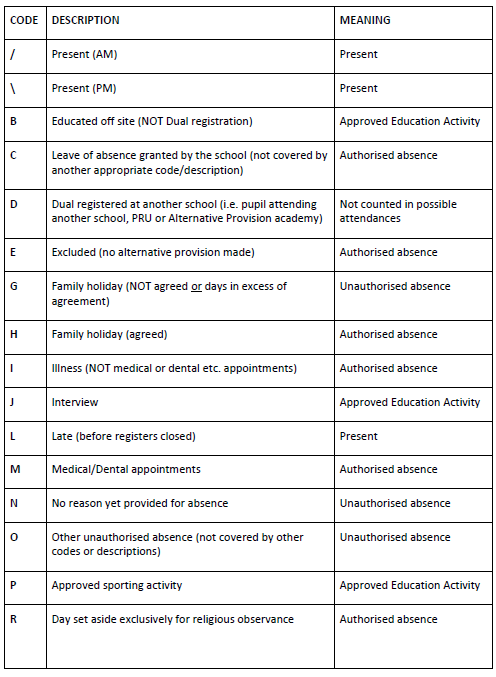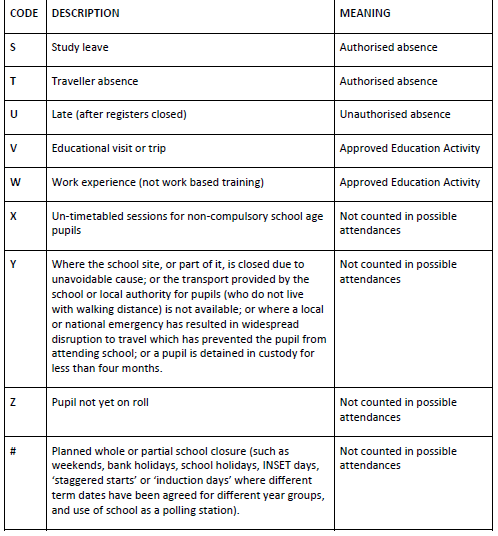It is the aim of Wicklea Academy that pupils should enjoy learning, experience success and realise their full potential. The Attendance Policy reflects this and recognises that regular attendance has a positive effect on the motivation and attainment of pupils.
As part of the Cabot Learning Federation (CLF), the academy is committed to the shared core purpose, which is at the HEART of all we do:

The academy strives to consistently deliver excellent educational experiences for pupils, improving their life chances and serving the communities of which we are a member.
This policy should be read in conjunction with existing trust-wide and academy policies including (but not limited to) the following policies:
This policy meets the requirements of the following legislation which sets out the legal powers and duties that govern school attendance including:
See Appendix 2.
An equality impact assessment has been undertaken for this policy in accordance with the
Federation’s equality, diversity and inclusion strategy and the Public Sector Equality Duty.
The personal information the academy uses to help manage attendance and absence is governed by the UK GDPR and Data Protection Act 2018. Much of this information will be sensitive, to both pupils and their parents/carers, and staff must take care to apply appropriate safeguards to ensure personal information is processed fairly and lawfully, is the minimum amount necessary to achieve our aims, is accurate, and where necessary, kept up to date, is not held for longer than is necessary and remains safe and secure.
Staff must record personal information accurately, being clear whether something is an opinion, reported by someone else, or fact. It is also important to remember that pupils and parents/carers can ask to see copies of the personal information the academy holds about them.
The academy aims to meet its obligations with regard to school attendance by promoting good attendance; ensuring every pupil has access to the full-time education to which they are entitled; and acting early to address patterns of absence.
This policy sets out the academy’s position on attendance and details the procedures that all parents/carers must follow to report their child absent from the academy.
It is vital that children develop regular attendance habits at an early age. Therefore, the academy will encourage parents/carers to send their children to every session that is available to them. If the child is unable to attend the academy for any reason, the parent/carer should inform the academy of the reason on the first day of absence. If the academy is concerned about a pupil’s attendance for any reason, the academy will contact the parent/carer to discuss the matter, in the first instance.
The academy will also support parents/carers to perform their legal duty to ensure their children of compulsory school age attend regularly, and will promote and support punctuality in attending lessons.
Pupils should attend the academy every day, unless they are really not well enough to. Children who attend regularly are more likely to feel settled in school, maintain friendships, keep up with their learning and gain the greatest benefit from their education. The academy wants all pupils to enjoy school, grow up to become emotionally resilient, confident and competent adults who are able to realise their full potential. Regular attendance and punctuality are essential in the workplace and children who are used to attending school on time, and on every occasion, unless they are too unwell to attend, will be better prepared for the attendance expectations in the workplace.
Education law defines parents as: all natural parents, whether they are married or not; any person who has parental responsibility for a child or young person; and any person who has care of a child or young person i.e. lives with and looks after the child.
A child becomes of ‘compulsory school age’ on the 1st January, 1st April or 1st September following their 5th birthday and ceases to be of compulsory school age on the last Friday in June of Year 11.
In April 2017 the Supreme Court clarified the definition of regular attendance to be attendance “in accordance with the rules prescribed by the school”, therefore if an absence is not authorised by the school, the pupil’s attendance is deemed to be irregular.
The academy will do all it can to encourage pupils to attend. The academy will make the best provision it can for any pupil who needs additional support in school or who is prevented from attending school, due to physical or mental health needs or disability. The academy recognises for disabled pupils, ‘reasonable adjustments’ may be needed to the school environment or to policies to support good attendance. Please see DfE guidance documents ‘Supporting pupils at school with medical conditions – December 2015’ and ‘Ensuring a good education for children who cannot attend school because of health needs- January 2013’ – or ask the academy for printed copies.
One of the most important factors in promoting good attendance is the development of positive attitudes towards school. To this end, the academy strives to provide a happy and rewarding experience for all children, and to foster positive and mutually respectful relationships with parents/carers.
By promoting good attendance and punctuality the academy aims to:
Any absence affects the pattern of a child’s schooling and regular absence may seriously affect their learning. The Department for Education (DfE) defines a pupil as a ‘persistent absentee’ when they miss 10% or more schooling across the school year, for whatever reason.
The table below indicates how what might seem like just a few days of absence can result in children missing a significant number of lessons.

The academy will monitor trends and patterns of absence for all pupils as a part of its standard procedures. However, it is recognised that sudden or gradual changes in a pupil’s attendance may indicate additional or more extreme safeguarding issues. In line with government guidance Keeping Children Safe in Education, local procedures and the academy’s Safeguarding Policy, staff will investigate and report any suspected safeguarding cases on to the relevant authorities. As part of the academy’s safeguarding duty and standard procedures, staff will inform the Local Authority and/or the Police of the details of any pupil who is absent from school when they cannot establish their whereabouts and is concerned for the pupil’s welfare.
If a pupil is not attending as required, where the academy deems it appropriate, staff may make home visits to see and speak to the pupil and parents/carers as part of the academy’s safeguarding and attendance processes. If staff are unable to see and speak to the pupil and parents/carers, they may contact the pupil’s emergency contacts and/or other professionals or contacts of the family, who they reasonably expect may be able to provide the academy with relevant information.
The law states that schools must take the attendance register at the start of the first session of each school day and once during the second session. On each occasion the school must record whether each pupil is:
Pupils are marked present if they are in the academy when the register is taken. If a pupil leaves the academy premises after registration, they are still counted as present for statistical purposes.
It is the duty of parents/carers to ensure that children attend school on time. This encourages habits of good timekeeping and lessens any possible classroom disruption. However, it is also recognised that pupils are sometimes late due to reasons such as caring for parents/carers or siblings, or transport difficulties.
If a pupil starts arriving late to the academy on a regular basis, the academy will work with the pupil and family to find out why the pupil is late and whether any support is needed for the pupil or family, in order to support the pupil to attend on time.
The Principal will meet with parents/carers of pupils who are frequently late, to further investigate reasons for lateness and discuss solutions to enable more punctual attendance.
When a pupil arrives late to the academy, they miss important events like assembly, teacher instructions and introductions; this can seriously disadvantage pupils. The table below indicates how frequent lateness can add up to a considerable amount of learning being lost.

‘Authorised absence’ means that the academy has either given approval in advance for a pupil of compulsory school age to be away from the school or has accepted an explanation offered afterwards as justification for absence. The following information outlines the main circumstances where absence may be authorised by the academy.
If a pupil needs to be sent home due to illness, this should be by agreement with an appropriately authorised member of academy staff. In such circumstances, the pupil must be collected from the academy office by a parent/carer or another authorised adult (unless otherwise agreed between the school and the parent/carer) and signed out in the ‘signing out’ book. No pupil will be allowed to leave the academy site without parent/carer confirmation.
The pupil must be collected from the academy office by the parent/carer or another authorised adult and signed out on the ‘Sign In’ system. No pupil will be allowed to leave the academy site without parent/carer confirmation.
Parents/carers are not required to contact the academy on the day of an absence if the parent/carer has already formally notified the academy prior to the day of absence and the absence has been agreed in advance. For example, a planned hospital appointment or an exceptional term time leave of absence which has already been agreed by the Principal in writing.
Parents/carers will be asked to supply details of at least three other adults who can be contacted in an emergency. It is the responsibility of parents/carers to keep these contact details up to date by communicating with the academy office.
The academy will follow up any absences where the parent/carer has not made contact to explain the reason. Following up on unexplained absences can take up a considerable amount of academy resources, therefore, the academy expects parents/carers to report all absences. If a parent/carer does not contact the academy on the morning of each absence, the absence may not be authorised, unless the academy is satisfied there is a good reason why the pupil is unable to attend and why the parent/carer was not able to contact the academy by the required time on the day of absence.
When the academy establishes the reason for the absence, it will be marked as authorised or unauthorised depending on the reason. If the academy is unable to establish the reason for absence, having followed the academy’s attendance procedures, the absence will be marked as unauthorised, using the O code.
If a pupil is not attending and the academy is unable to establish the reason why and/or confirm the pupil’s whereabouts, the academy will take appropriate action which will depend on the circumstances of each case. This could include, but is not limited to: contacting the pupil’s emergency contacts, or other contacts of the family who the academy reasonably expect may be able to advise of the pupil’s whereabouts; contacting other professionals; contacting siblings’ schools; home visits to the family address; making
enquiries with neighbours; requesting a Welfare Check from the police; and making referrals to Children’s Social Care.
The academy recognises that rewarding good and improved attendance should be carefully considered in order to ensure it does not make pupils who have poor attendance, feel marginalised, worried or guilty about their low attendance rate; its impact on the pupil’s own learning or the learning or rewards for the class as a whole.
The academy will regularly review any reward systems to ensure they are not negatively impacting on individual pupils or groups of pupils.
When the academy has concerns about the attendance of a pupil, staff will do their best to make the parents/carers aware of the concerns about their child’s attendance in the most accessible way possible, communications will be provided in accessible formats and can be offered in different languages if requested.
The academy recognises that pupils who are Young Carers may have caring responsibilities that impact on their punctuality and/or attendance. Where this is the case the academy will work with the pupil and family to encourage them to access appropriate support, including direct support from Young Carers and any other support the pupil and family may need; the academy will also provide support in school where appropriate.
Where appropriate, the academy will involve all parents/carers in order to ensure each are aware of their child’s attendance pattern and are able to support the child’s attendance to improve. Where a child lives with different parents/carers on different days the academy will take this into consideration when working with the parents/carers.
Where there are continued concerns about a pupil’s attendance which are not resolved informally, parents/carers may be asked to meet with the academy to discuss the matter more formally. In some cases, this may result in a formal action plan being produced. The academy may also invite other involved professionals, where relevant.
The law does not grant parents/carers the automatic right to take their child out of school during term time for holidays or other absence such as trips and visits.
The academy will not authorise any leave of absence in term-time unless satisfied the reason for absence is exceptional. The academy will consider each application individually.
Parents/carers are asked not to make plans to take their child out of school without making a request to the school first. The request should be made by the parent/carer with whom the child normally lives.
Parents/carers wishing to request leave for their child should complete a Leave of Absence Request form which is available from the academy. The request should be submitted as soon as it is anticipated; and, wherever possible, at least four weeks before the absence.
Parents may be required to provide the academy with additional evidence in order to support a leave of absence request.
The academy will consider the individual facts and circumstances of the case; following consultation with other staff as required, including the Designated Safeguarding Lead (DSL).
A leave of absence is granted entirely at the academy’s discretion.
The absence should be for the shortest time possible – if an absence is agreed, the principal will decide how many days of absence will be authorised. If the pupil is absent for more days than were authorised by the academy, the remaining days absent will be recorded as unauthorised absence.
Any holidays and other absence such as trips and visits which have not been agreed by the academy will be recorded as unauthorised.
Parents/carers should be aware unauthorised absence may result in a Penalty Notice or Prosecution. See ‘Unauthorised Absence’ section for more information.
If the academy has any concerns about possible safeguarding risks, staff will follow the necessary protocols. (See the academy’s Safeguarding Policy for more information.)
Unauthorised absence is where the academy is not satisfied with the reason given for the absence, or where no reason has been provided.
Unauthorised absences may result in Legal Sanctions, usually Penalty Notices or Prosecutions. See ‘Penalty Notices and Prosecutions’ section for more information.
Unauthorised absence includes (but is not limited to) absences due to:
Where the academy has cause for concern about the actual reason for a pupil’s absence, staff may seek additional information or evidence from parents/carers regarding the absence, and/or make a home visit in order to verify the reason. If the reason cannot be verified and the academy has cause to believe the reason given for absence may not be genuine, parents/carers may be asked to provide satisfactory proof of the reason before the academy authorises the absence. If satisfactory proof is not provided, the school may record the absence as unauthorised.
Under section 444 of the Education Act 1996, if a child of compulsory school age, who is a registered pupil at a school, fails to attend regularly at the school his/her parent(s) are guilty of an offence. This applies to both resident and non-resident parents who may both be subject to legal sanctions if their child fails to attend school regularly. It also applies to others who may not be the parent but may have day to day care of the child. If an absence is not authorised by the school, the pupil’s attendance is deemed to be irregular.
Penalty Notices and prosecution proceedings are issued to each parent/carer with responsibility for the child and are issued for each child with unauthorised absence. For example, in the case of Penalty Notices, if two siblings have unauthorised absence, and there are two parents/carers with responsibility for the children, four Penalty Notices would be issued.
The academy will refer cases of unauthorised absence that meet the threshold for a Penalty Notice to the Local Authority for legal action, unless there are reasonable grounds for not doing so. This will include unauthorised absence due to term time holiday or other trips/visits, and other types of unauthorised absence. When referring for legal sanctions, the academy will show that the parent/carer has been warned they are at risk of a Penalty Notice or other legal sanction. The outcome of a referral to the Local Authority may be a Penalty Notice or Prosecution.
See table below and DfE statutory guidance on School attendance parental responsibility measures for more information, and the Local Authority’s Penalty Notice Code of Conduct, including thresholds, which is available from Bristol City Council.

Under the Equality Act 2010, schools are required to make ‘reasonable adjustments’ for disabled pupils (defined as those with a ‘physical or mental impairment which has a substantial and long-term adverse effect on that person’s ability to carry out normal day to day activities.’ Some specified medical conditions, HIV, multiple sclerosis and cancer are all considered as disabilities, regardless of their effect.) This may include changes to the physical environment, curriculum or the way information is provided, as well as providing auxiliary aids and equipment, or tailored services. Failure to make appropriate adjustments may impact on a pupil’s attendance.


In line with the expectations of the Department for Education, all pupils of compulsory school age are entitled to a full-time education, suitable to their age, ability and aptitude, and any special educational needs or disabilities that they may have.
In very exceptional circumstances there may be a need for a temporary part-time timetable to meet a pupil’s individual needs. For example, where a medical condition prevents a pupil from attending full-time education and a part-time timetable is considered as part of a re- integration package.
If, for any reason, the academy is unable to provide a pupil with a full-time education due to the pupil’s needs, staff will work with the pupil, parents/carers and other agencies where appropriate, to come to an arrangement that is deemed to be in the best interests of the child wherever possible.
Any part-time timetable should be in place for the shortest amount of time possible, it must not be treated as a long-term solution. It should be reviewed at least every two weeks, whilst arrangements are made to support the pupil’s return to full-time education at the academy or, where appropriate, at alternative provision.
A decision to place a pupil on a part-time timetable should be approved by the Principal and must be agreed by the parents/carers. The SENCO and DSL, as well as any other relevant members of staff, should also be aware of such arrangements and involved with decision making where appropriate. Discussions and agreements should be clearly documented in writing and relevant information should be recorded in the academy’s management information system and CPOMS. The academy will be mindful of any additional safeguarding risks to the pupil when they are not timetabled to attend school and will therefore consider carefully whether a part-time timetable is an appropriate measure.
If the pupil’s part-time timetable means the pupil is expected to arrive at the academy after the register closes in the morning and/or be absent for the academy’s afternoon registration period, any such am and/or pm registrations must be recorded with the C code ‘Leave of absence authorised by the school’.
When pupils are attending educational activities off the academy site, that have been approved by the academy, the register will be marked to show this is the case. (See DfE Working together to improve school attendance guidance for more information.)
If a pupil is participating in a supervised sporting activity off the academy site, which is of an educational nature, approved by the academy and supervised by someone authorised by the Principal, such activity should be marked using the P code ‘Approved Sporting Activity’.
This includes Bristol Hospital Education Service, Voyage Learning Campus and Pathways Learning Centre.
This includes Learning Partnership West. expected to return to the main school (in which case the pupil will come off roll at the ‘subsidiary’ school).
In accordance with the DfE Working together to improve school attendance guidance, the academy will record pupils as code Y ‘Unable to attend due to exceptional circumstances’ in the following circumstances (such circumstances are not recorded as absences):
If the academy has reason to believe the pupil may no longer be living at the address held on record and staff are unable to confirm the whereabouts of the pupil through the academy’s usual processes, staff will follow the CLF CME and Pupil Tracking guidance, along with Bristol City Council’s CME guidance, and make Pupil Tracking referrals as appropriate.
If a parent/carer notifies the academy in writing that the pupil and family are moving out of the area and the pupil no longer requires a place, the academy will remove the pupil from roll from the date of moving and will, at the same time, notify the Local Authority (LA) using the CME referral form.
The academy will add and delete pupils from roll in line with the law and will complete Bristol City Council (BCC) CME referrals and Grounds for Deletion notification forms in accordance with BCC’s guidance.
The academy will seek advice from the CME team if unsure about any individual cases: childrenmissingeducation@bristol.gov.uk
When removing a pupil from roll due to Elective Home Education (EHE) or Permanent Exclusion the academy will also follow the relevant LA EHE and Exclusion notification processes.
If a pupil on roll lives in a different LA area, the academy will follow the other LA’s processes where appropriate.
The academy will share pupil’s attendance information during parent/carer consultations in terms 2 and 4 and provide parents/carers with a copy of their attendance summary for the year along with their end of year reports in Term 6. If parents/carers wish to see a copy of their child’s attendance summary at any other time during the year, they can ask for a printed copy at the academy office.
Where a pupil’s attendance drops below 97%, the academy may contact parents/carers to highlight this, unless there is a good reason not to.
All absences are recorded in the attendance register in the academy’s management information system. Information about the reason for the absence, how it was reported and by whom, and any additional information pertinent to the absence may also be recorded.
This policy will be reviewed annually by the Principal, or more frequently if there are changes to legislation and guidance. At every review, the policy will be shared with the Academy Council.


Explain the roles and responsibilities of your academy council and staff here.
Please ensure you outline how you monitor the attendance of vulnerable groups, how are they identified and what course of action is likely to be taken.
Please detail who has key responsibility for what. All of these bullet points must feature in your roles and responsibilities across your academy:
Include information about the following:
The Board is responsible for approving the CLF template policy.
The Academy Council is responsible for approving local adaptations to the CLF template policy and monitoring its implementation and effectiveness.
The Academy Council is responsible for monitoring attendance figures for the whole academy at least 6 times a year. It also holds the Principal to account for the implementation of the attendance policy.
The Principal is responsible for ensuring this policy is implemented consistently across the academy, and for monitoring academy-level absence data and reporting it to academy council.
The Principal is responsible for having a deep and clear understanding of attendance by group, such as gender, pupils entitled to Free School Meals, Pupil Premium pupils, pupils with SEND, Children in Care and attendance by Ethnicity and Language (English/EAL). Also privileging and acting to improve the attendance of pupils that may fall into smaller groups, or the attendance of individual pupils with protected characteristics.
The Principal, as Designated Safeguarding Lead, is responsible for providing safeguarding support and advice to attendance colleagues as appropriate, including in response to term-time leave requests and CME cases; taking safeguarding action where necessary.
The Principal is responsible for ensuring staff are clear about their roles and responsibilities in relation to attendance and have the required knowledge and skills to fulfil them.
The Principal also supports other staff in monitoring the attendance of individual pupils and meets with families to discuss attendance where appropriate.
The Principal makes requests for penalty notices and requests for other legal action, to the Local Authority where necessary.
The Attendance Team consists of the Principal (Designated Safeguarding Lead), Family Link and Pastoral Support Worker and Attendance Administrator (Admin Team member).
They will meet as a team at least [frequency – e.g. fortnightly] to monitor and review attendance across the academy – for individual pupils, vulnerable groups and the whole academy. During their meetings, the Attendance Team will identify pupils whose attendance is a cause for concern and put attendance interventions in place as necessary. Depending on the level of concern, the Attendance Team will involve class teachers and other relevant staff and co-ordinate meetings with parents/carers. Where considered necessary a formal action plan will be produced.
The Attendance Team is responsible for regularly reviewing the academy’s attendance procedures –
including strengths and weaknesses and seeking feedback from other staff.
The Attendance Administrator:
Academy office staff are responsible for ensuring that the daily registers are completed accurately and on time, recording the reasons for absences and reporting any concerns or patterns of absence to the Attendance Administrator.
Academy office staff are expected to take calls from parents/carers about absence and record the information on the academy’s management information system.
Academy office staff are responsible for the timely liaison with parents/carers to establish reasons for absence.
The SENCO will meet with a member of the Academy Attendance Team fortnightly to review the attendance of the pupils on the academy’s Vulnerable List/SEND Register and agreeing any action needed.
The Family Support Worker (FLW) will focus on safeguarding and how attendance links to wider safeguarding concerns. As Deputy DSL, the FLW will take any attendance concerns to the academy’s weekly Safeguarding Team meetings.
The FSW will be the point of contact for parents/carer who have their own concerns about their child’s attendance and will meet with parents/carers as and when necessary, share attendance concerns and draw up attendance plans or contracts as necessary. The FSW will also liaise with external agencies and make referrals as required.
Class teachers are responsible for recording their pupils’ attendance on a daily basis, using the correct codes, and submitting this information to the academy office.
Where there are attendance concerns, either raised by the class teachers themselves or by the Attendance Team, they will ‘check-in’ with the pupil to find out about any reasons for absence as part of their responsibilities under the academy’s Safeguarding Policy.
Class teachers may also be asked to meet with parents/carers whose child has a falling level of attendance and is flagged as a concern by the Attendance Team.
